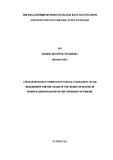| dc.description.abstract | A lot of research has been done on the causal relationship between stock prices and the fluctuations of the exchange rate, which has concentrated on developed
economies. Little research has been done on the least developed economies as they have nascent and shallow stock markets in comparison to the developed economies.
As a result of globalization and financial cross border integration, majority of open
economy countries have adapted a floating exchange system that depends on financial market fundamentals. This study has been done to establish the relationship between
exchange rate fluctuations and stock prices in Rwanda. The study aims at informing both the financial regulators and potential investors on the dynamics of the effect
between the stock and foreign exchange markets. In addition, the data used is
secondary in nature, collected over a spun of three years on a monthly basis. The study adopts a causal relationship between exchange rate and stock prices applying
Granger causality to test for co-integration between the two variables. Therefore, an econometric model is developed for the analysis and proposes that there is no long
run relationship between the exchange rate and stock prices. Nevertheless, there exists
a short run relationship between the two variables exhibiting a unidirectional relationship from the currency market to the stock market in Rwanda. It is further
reported that there exists a strong relationship between the stock price index and exchange rate in Rwanda. Finally, the paper recommends that the exchange rate
volatility should be controlled in the short run. The formulated financial market
policies should enhance adequacy, capacity building and structure the currency environment to accommodate a wider set of a stable foreign exchange market.
Thereby, enhancing financial efficiency and reduce information asymmetry. | en_US |

